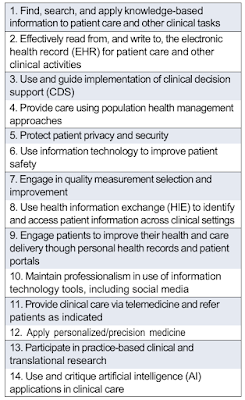A number of interesting papers on physician competencies in artificial intelligence (AI) have been published recently, and there is no question that all 21st century healthcare professions must have a thorough understanding of the benefits and limitations of AI that they are likely to use in their clinical work.(1-5)
One of my concerns, however, is that the focus on AI and not the larger issues of clinical informatics risks undermining not only a full understanding of the impact of AI, but also most of the other informatics-related knowledge and skills that are important to clinical practice. These include skills in using the electronic health record (EHR); accessing clinical knowledge using search systems; being facile with clinical decision support and health information exchange; protecting privacy and security, engaging patients, their data, and their devices; and applying data in tasks such as population health, public health, and clinical and translational research. At a minimum, these competencies provide a foundation of applying data, information, and knowledge to improve human health and healthcare delivery, but they also inform the application of AI in biomedicine and health.
About a decade ago, some colleagues and I published a paper outlining what we believed were the required competencies in clinical informatics in 21st century practice.(6) These competencies were then used to develop a curriculum in clinical informatics for our medical students.(7) While AI is now a prominent part of biomedicine and health, and a good deal more in society, the initial competencies have, in my opinion, stood the test of time.
There were originally 13 competencies in the list. In 2020, it became apparent that we needed to add an additional competency in machine learning, and in a textbook chapter (8) and blog post, we added that as a 14th competency. Now of course, it is probably better to use AI explicitly in that competency. As such, I present a new version of the list of competencies in clinical informatics for medical education, which of course applies to all health professions students and practitioners. (Textual version in the Appendix below.)
References
- Ötleş, E., James, C.A., Lomis, K.D., Woolliscroft, J.O., 2022. Teaching artificial intelligence as a fundamental toolset of medicine. Cell Rep Med 3, 100824.
- James, C.A., Wachter, R.M., Woolliscroft, J.O., 2022. Preparing Clinicians for a Clinical World Influenced by Artificial Intelligence. JAMA 327, 1333–1334.
- Russell, R.G., Lovett Novak, L., Patel, M., Garvey, K.V., Craig, K.J.T., Jackson, G.P., Moore, D., Miller, B.M., 2023. Competencies for the Use of Artificial Intelligence-Based Tools by Health Care Professionals. Acad Med 98, 348–356.
- Liaw, W., Kueper, J.K., Lin, S., Bazemore, A., Kakadiaris, I., 2022. Competencies for the Use of Artificial Intelligence in Primary Care. Ann Fam Med 20, 559–563.
- Goodman, K.E., Rodman, A.M., Morgan, D.J., 2023. Preparing Physicians for the Clinical Algorithm Era. N Engl J Med.
- Hersh, W.R., Gorman, P.N., Biagioli, F.E., Mohan, V., Gold, J.A., Mejicano, G.C., 2014. Beyond information retrieval and electronic health record use: competencies in clinical informatics for medical education. Adv Med Educ Pract 5, 205–212.
- Hersh, W., Biagioli, F., Scholl, G., Gold, J., Mohan, V., Kassakian, S., Kerns, S., Gorman, P., 2017. From Competencies to Competence: Model, Approach, and Lessons Learned from Implementing a Clinical Informatics Curriculum for Medical Students, in: Health Professionals’ Education in the Age of Clinical Information Systems, Mobile Computing and Social Networks. Elsevier, pp. 269–287.
- Hersh, W., Ehrenfeld, J., 2020. Clinical Informatics, in: Health Systems Science, 2nd Edition. pp. 156–170.
- Find, search, and apply knowledge-based information to patient care and other clinical tasks
- Effectively read from, and write to, the electronic health record (EHR) for patient care and other clinical activities
- Use and guide implementation of clinical decision support (CDS)
- Provide care using population health management approaches
- Protect patient privacy and security
- Use information technology to improve patient safety
- Engage in quality measurement selection and improvement
- Use health information exchange (HIE) to identify and access patient information across clinical settings
- Engage patients to improve their health and care delivery though personal health records and patient portals
- Maintain professionalism in use of information technology tools, including social media
- Provide clinical care via telemedicine and refer patients as indicated
- Apply personalized/precision medicine
- Participate in practice-based clinical and translational research
- Use and critique artificial intelligence (AI) applications in clinical care

